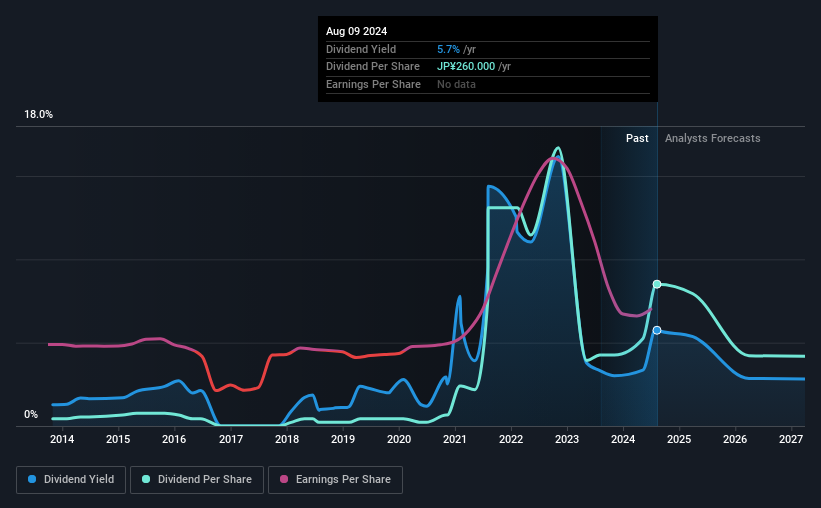- Japan
- /
- Marine and Shipping
- /
- TSE:9101
Nippon Yusen Kabushiki Kaisha's (TSE:9101) Upcoming Dividend Will Be Larger Than Last Year's
The board of Nippon Yusen Kabushiki Kaisha (TSE:9101) has announced that it will be paying its dividend of ¥130.00 on the 2nd of December, an increased payment from last year's comparable dividend. This makes the dividend yield 5.7%, which is above the industry average.
See our latest analysis for Nippon Yusen Kabushiki Kaisha
Nippon Yusen Kabushiki Kaisha's Dividend Is Well Covered By Earnings
Impressive dividend yields are good, but this doesn't matter much if the payments can't be sustained. Based on the last payment, Nippon Yusen Kabushiki Kaisha was paying only paying out a fraction of earnings, but the payment was a massive 180% of cash flows. While the business may be attempting to set a balanced dividend policy, a cash payout ratio this high might expose the dividend to being cut if the business ran into some challenges.
Over the next year, EPS is forecast to fall by 16.4%. If the dividend continues along the path it has been on recently, we estimate the payout ratio could be 55%, which is comfortable for the company to continue in the future.

Dividend Volatility
The company has a long dividend track record, but it doesn't look great with cuts in the past. The dividend has gone from an annual total of ¥13.33 in 2014 to the most recent total annual payment of ¥260.00. This means that it has been growing its distributions at 35% per annum over that time. Nippon Yusen Kabushiki Kaisha has grown distributions at a rapid rate despite cutting the dividend at least once in the past. Companies that cut once often cut again, so we would be cautious about buying this stock solely for the dividend income.
The Dividend Looks Likely To Grow
Given that the dividend has been cut in the past, we need to check if earnings are growing and if that might lead to stronger dividends in the future. Nippon Yusen Kabushiki Kaisha has impressed us by growing EPS at 34% per year over the past five years. Earnings have been growing rapidly, and with a low payout ratio we think that the company could turn out to be a great dividend stock.
Our Thoughts On Nippon Yusen Kabushiki Kaisha's Dividend
Overall, we always like to see the dividend being raised, but we don't think Nippon Yusen Kabushiki Kaisha will make a great income stock. With cash flows lacking, it is difficult to see how the company can sustain a dividend payment. This company is not in the top tier of income providing stocks.
It's important to note that companies having a consistent dividend policy will generate greater investor confidence than those having an erratic one. However, there are other things to consider for investors when analysing stock performance. For example, we've identified 4 warning signs for Nippon Yusen Kabushiki Kaisha (1 can't be ignored!) that you should be aware of before investing. Looking for more high-yielding dividend ideas? Try our collection of strong dividend payers.
Valuation is complex, but we're here to simplify it.
Discover if Nippon Yusen Kabushiki Kaisha might be undervalued or overvalued with our detailed analysis, featuring fair value estimates, potential risks, dividends, insider trades, and its financial condition.
Access Free AnalysisHave feedback on this article? Concerned about the content? Get in touch with us directly. Alternatively, email editorial-team (at) simplywallst.com.
This article by Simply Wall St is general in nature. We provide commentary based on historical data and analyst forecasts only using an unbiased methodology and our articles are not intended to be financial advice. It does not constitute a recommendation to buy or sell any stock, and does not take account of your objectives, or your financial situation. We aim to bring you long-term focused analysis driven by fundamental data. Note that our analysis may not factor in the latest price-sensitive company announcements or qualitative material. Simply Wall St has no position in any stocks mentioned.
About TSE:9101
Nippon Yusen Kabushiki Kaisha
Provides logistics services in Japan, North America, Asia, and internationally.
Excellent balance sheet established dividend payer.
Similar Companies
Market Insights
Weekly Picks


Crazy Undervalued 42 Baggers Silver Play (Active & Running Mine)


Fiducian: Compliance Clouds or Value Opportunity?

Willamette Valley Vineyards (WVVI): Not-So-Great Value
Recently Updated Narratives

THE KINGDOM OF BROWN GOODS: WHY MGPI IS BEING CRUSHED BY INVENTORY & PRIMED FOR RESURRECTION


The "Molecular Pencil": Why Beam's Technology is Built to Win


ADNOC Gas future shines with a 21.4% revenue surge
Popular Narratives


MicroVision will explode future revenue by 380.37% with a vision towards success


NVDA: Expanding AI Demand Will Drive Major Data Center Investments Through 2026




